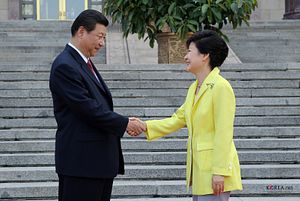The direct communication between China and South Korea in contemporary world politics does not have a very long history – just a little more than two decades since their diplomatic relations were established in 1992. From a political view, the establishment of diplomatic ties was pushed by a kind of shared perception on gradually emerging “common interests” in the changed regional power structure. In other words, the move was very realistic in political and economic terms, but was not an ideological decision.
However, both China and South Korea have acknowledged certain epistemic commonalities, particularly from a traditional and cultural perspective, for example ethical values and social orders based on Confucianism – although neither China nor South Korea can be viewed as a truly “Confucian state” in a conventional sense. China has been trying to revive traditional Confucianism (e.g., the neo-Confucianism) and bring it into China’s unique one-party political system. Meanwhile, South Korea has long since adopted the Western democratic system but many elements of Confucian traditions remain in Korean social lives and family environments.
Despite a shared background in Confucianism, in other words, there are differences in how these cultural traditions are interpreted and enacted in modern Chinese and Korean societies.
As one example, when it comes to common cultural values and Confucian traditions, China seems to pay more attention to the “commonality” of those cultural elements from a continuous historical view – emphasizing China’s role as cultural wellspring. South Korea, on the other hand, emphasizes the inheritance and development of those common cultural elements in Korean society specifically – emphasizing the uniqueness of Korean culture.
Take the UNESCO’s designation of the Gangneung Danoje Festival as an example. Some Chinese media and netizens took issue with this, since they believe that the tradition was introduced from China. Meanwhile, the Koreans believe that there is no issue: they have enough reason to submit the festival to UNESCO since it has been a very “Korean” tradition for a long time.
However, when it comes to perceptions of their respective national developmental models, there is an interesting change. South Koreans are generally very proud of their successful “East Asian Model,” which they see as a possible model for other East Asian countries (particularly China): an economic boom led by a strong and authoritarian government, a series of socioeconomic changes followed by more democratic political appeals from the elites and the middle class, and finally a democratic transformation. Meanwhile, China firmly insists on its own developmental model, which is unique and very “Chinese,” and which cannot be replicated elsewhere.
Is it possible for China and South Korea to start to work on building an “epistemic community”? Though both countries share a number of cultural traditions, a grand unified Confucian community disappeared over a hundred years ago, when China’s Qing Dynasty was defeated by Meiji Japan. Before then, Confucian elites with commonly recognized education and knowledge bases had upheld a network that played a very important role in shaping relations between ancient China and Korea. For example, the “Poem and Prose Diplomacy” led by a group of well-educated elites and scholars from both sides helped to maintain a uniquely close relationship between Ming empire and Chosun kingdom.
In contemporary politics, constructivism indicates that shared experiences and knowledges within a network of professionals may lead to the formation of an “epistemic community.” This network of professionals in could include government branches and officials, various types of non-governmental organizations, and individuals. The development of bilateral relations between China and South Korea, particularly in the past decade, tells us that building an epistemic community may not be a castle in the air. The current regional power structure may hinder a further political aligning of China and South Korea, but it does not stop public diplomacy between these two neighbors. In fact, the ever-expanding connections between these two countries, particularly non-governmental connections, have provided many possibilities.
According to Beijing News, there are more than 1,000 flights travelling between China and South Korea every week. That level of people-to-people exchange certainly could bring about an extraordinarily large complex of networks among not only governmental officials, but also scholars, businessmen, travelers, and others that share common knowledge, experiences and also interests in their respective domains. The problem, if any, lies in the ever-changing political climate in this region, and the political will of the leaders from both sides.
Although both countries may certainly find a way to expand the significance of the shared cultural values and traditions in their bilateral relations, it won’t be easy for them to forge an epistemic community based on cultural traditions, including Confucian values. However, when China emphasizes its relationships with neighboring countries, the key terms it advocates are “community of common destiny” and “community of common interests,” suggesting that destiny and interests can be shared – even while political cultures and developmental models can differ. To use another Chinese mantra: seek common ground while reserving differences.

































